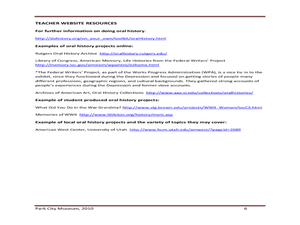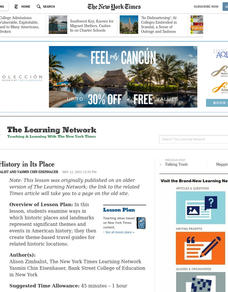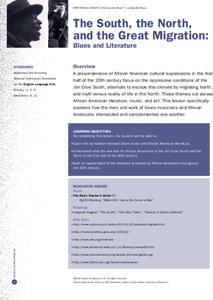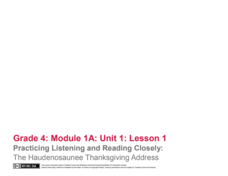National Constitution Center
AP English Language—Precision of Language
Say what you mean and mean what you say. The Precision of Language addresses the importance of words, especially when they concern a person's rights. Scholars take a look at many different examples and complete questions analyzing the...
National Endowment for the Humanities
A “New English” in Chinua Achebe’s “Things Fall Apart”: A Common Core Exemplar
To examine the “New English” Chinua Achebe uses in Things Fall Apart, readers complete a series of worksheets that ask them to examine similes, proverbs, and African folktales contained in the novel. Individuals explain the meaning...
Curated OER
Who Invented English Anyway?
In these English lesson plans, students use video, the Internet and non-fiction essays to research the history of the English language. They write a short research paper and design a PowerPoint presentation showcasing their findings.
Curated OER
Oral History: Park City Museum
Bring U.S. history to your language arts class with this lesson. Middle schoolers complete an interview for an oral history project, and discuss the importance of oral histories - and how they embellish written accounts. They write...
Curated OER
Traditions and Languages of Three Native Cultures: Tlingit, Lakota, and Cherokee
Students explore the connections between tradition and language. They examine the environment, history and culture of the Tlingit, Lakota and Cherokee tribes and identify the importance of maintaining languages for oral traditions.
Curated OER
Putting History in its Place
Examine ways in which historic places and landmarks represent significant themes and events in American history. Then create theme-based travel guides for related historic locations. This lesson plan requires informational reference...
English Enhanced Scope and Sequence
Differentiate between Formal and Informal Language
The Pledge of Allegiance, the Gettysburg Address, the National Anthem, and the Preamble to the Constitution all get close attention in an exercise that asks learners to rewrite these formally-worded documents into informal language....
Curated OER
My Arkansas Family Tree
Here is a two-part instructional activity that introduces learners to genealogy by having them create family trees, and map the movements of their ancestors. While this resource is designed for kids who live in Arkansas, it certainly can...
Curated OER
Important Arkansas People
Famous people in the history of Arkansas are the focus of a history lesson for kindergartners. Pupils identify important Arkansas citizens, such as President Bill Clinton. They create an illustrated poem that features some of the...
Curated OER
Black History Lesson Plan: Gwendolyn Brooks
Learn more about the work of Gwendolyn Brooks with a language arts lesson plan. Young learners read an informational passage about the acclaimed poet before attempting a shape poem of their own.
Curated OER
Reliving History through Slave Narratives
Helpful for an American literature or history unit, this instructional activity prompts middle schoolers to examine slavery in the United States. They read slave narratives that were part of the Federal Writers' Project and then conduct...
Curated OER
The South, the North and the Great Migration: Blues and Literature
Here is a complex lesson plan that interweaves the history of the Jim Crow South and the Great Migration with the study of poetry, art, and blues music from the Harlem Renaissance. The plan helps young historians develop a deep...
Curated OER
Formal versus Informal Language
Engage in an activity that focuses on the concepts of formal and informal language use. Middle and high schoolers compare and contrast each style by using a Venn diagram that includes some examples. They read and hear a passage of lyrics...
Curated OER
Figurative Language
What is figurative language, and why do we use it? Introduce your high schoolers to some examples and discuss the importance of including this element in your writing. After studying a text and searching for examples, writers will...
Curated OER
A Very Short History of the English Language
Students apply their knowledge of world history to research major influences on the language that has become the English we speak today; develop timeline of events in Britain and explain contributions of various invading groups to the...
Curated OER
English Literature: An Overview
Relate literary works and authors to the major themes of English literature from the Anglo-Saxon period through the 20th century. Working in groups, high schoolers will evaluate period philosophy, religion, and politics that influenced...
Curated OER
Active Reading with American History
Explore connections within and between informational texts with this lesson about encyclopedia articles. Middle schoolers write encyclopedia articles focusing on topics in American history. They discuss how to determine credibility...
Curated OER
"No News Like Ancient News"
Want to know more about Ancient history? Young historians will read a minimum of two web sites to complete the chart "Residents of Olympus". They choose one Greek god or goddess to research. This could be a small group activity or...
Curated OER
Osage, Legend, and Arkansas History
Elementary schoolers evaluate the legend of Norristown Mountain by looking at facts about the Osage Indians and the legend itself. They do an exploration of Arkansas' Native American groups which includes a look at their legends,...
Curated OER
Thanksgiving
Introduce the basics of Thanksgiving with a language arts instructional activity. As pupils practice observation skills, vocabulary, and reading comprehension, they design paper turkeys by outlining their hands and feet and by...
Curated OER
Read All About It! California History of the 30s and 40s
Explore the Great Depression! Discover the challenges people experienced during the time period. Learners investigate photographs from the Dust Bowl and WWII era and create a story line about the photographs, writing a newspaper article...
Curated OER
"I" Witness to History
Young journalists write diary entries from the point of view of a person involved in a historical event. They focus on including facts, clear narration, and accurate description of the individual's feelings.
Curated OER
A Discourse on the History of Language
Analyze and make inferences from the information used by linguists to construct the evolution of languages. They research different dating techniques to explain how scientists infer age with evidence.
EngageNY
Practicing Listening and Reading Closely: The Haudenosaunee Thanksgiving Address
Thanksgiving doesn't occur only once a year for the Haudenosaunee. Weave an instructional activity about reading closely with an inspiring message about eternal gratitude for all of the elements of creation into a unit on Native American...

























